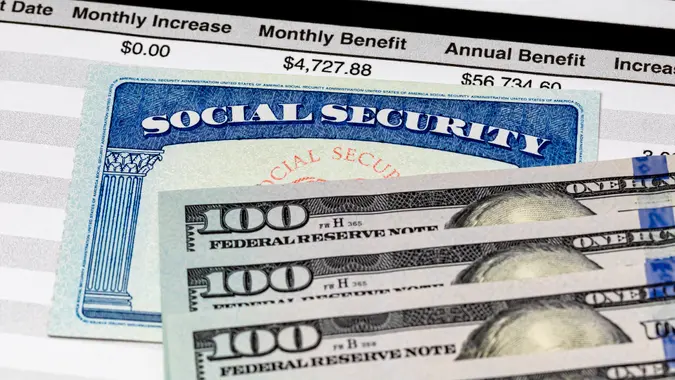10 Countries Where the U.S. Won’t Send Your Social Security Payments

Commitment to Our Readers
GOBankingRates' editorial team is committed to bringing you unbiased reviews and information. We use data-driven methodologies to evaluate financial products and services - our reviews and ratings are not influenced by advertisers. You can read more about our editorial guidelines and our products and services review methodology.

20 Years
Helping You Live Richer

Reviewed
by Experts

Trusted by
Millions of Readers
If you’re entitled to Social Security benefits, you don’t have to live in the United States to get them. Payments are sent nearly everywhere around the world, though there are some exceptions.
U.S. citizens can continue to receive payments outside the country as long as you’re eligible for a payment and are in a country where payments are sent, according to the Social Security administration. If you’re not a U.S. citizen, you must meet certain conditions for payment.
Living “outside the United States” means you are not in one of the 50 states, the District of Columbia, Puerto Rico, the U.S. Virgin Islands, Guam, the Northern Mariana Islands or American Samoa for at least 30 days in a row. The SSA considers you to be “outside the United States” until you return and stay in the U.S. for at least 30 days in a row.
If you are not a U.S. citizen, you also might have to prove you were lawfully present in the United States for that 30-day period.
As of June 2023, there are the 10 countries where the United States won’t send your Social Security payments:
- Azerbaijan
- Belarus
- Cuba
- Kazakhstan
- Kyrgyzstan
- Moldova
- North Korea
- Tajikistan
- Turkmenistan
- Uzbekistan
If you’re a U.S. citizen residing in either Cuba or North Korea, you can get all the payments the SSA withholds once you move to a country where payments are allowed. If you’re not a U.S. citizen, you can’t receive payments for the months you lived in Cuba or North Korea — even if you go to another country and satisfy all other requirements.
As for the other eight countries on the banned list: The SSA said it will make exceptions for certain eligible persons. To qualify for an exception, you must meet and agree to restricted payment conditions. For more information about these conditions and the qualifications for an exception, contact the Social Security Administration or your Federal Benefits Unit.
If you’re not a U.S. citizen or don’t meet one of the conditions for continued payments, the SSA will stop your payments after you’ve been outside the United States for six full calendar months. Once this happens, the agency can’t start your payments again until you come back and stay in the U.S. for a full calendar month — meaning you must be in the U.S. on the first minute of the first day of any month and stay through the last minute of the last day of that month. The SSA might also ask you to prove you’ve been lawfully present in the United States for the full calendar month.
For more information, visit this SSA site or call 800-772-1213.
More From GOBankingRates
- Make Yourself Money Smart: 20 ChatGPT Prompts To Increase Your Wealth
- 8 Home Items To Avoid Buying at Dollar Tree This Spring
- 16 Best Places To Retire in the US That Feel Like Europe
- 3 Things You Must Do When Your Savings Reach $50,000
Bob Haegele contributed to the reporting for this article.
 Written by
Written by  Edited by
Edited by 























